Super Talent SSD: 16GB of Solid State Goodness
by Gary Key on May 7, 2007 4:00 AM EST- Posted in
- Storage
Hard Disk Performance: PCMark05
We are utilizing the HDD test suite within PCMark05 for further comparative hard disk scores as it provides a mixture of actual application results and specific read/write percentages utilized within these programs. It is also a readily available benchmark that others can use for comparative purposes. The program utilizes the RankDisk application within the Intel iPeak SPT suite of tools to record a trace of disk activity during usage of real world applications. These traces are then replayed to generate performance measurements based upon the actual disk operations within each application. The HDD test suite contains 53% read and 47% write operations with each trace section utilizing varied amounts of read or write operations. Additional information about the test suite can be found in PDF format here PCMark05 whitepaper.
The PCMark05 test results are based upon the following trace runs:
Windows XP Startup: This test consists of 90% reading and 10% writes that tracks XP activities at start-up.
Application Loading: This test consists of 83% reading and 17% writes that tracks the opening and closing of the following programs.
File Write: This test consists of 100% write activities by writing 680MB of files onto the hard disk.
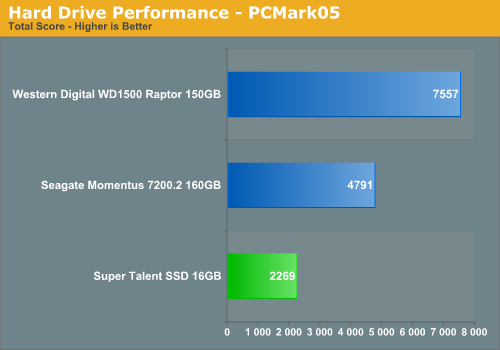
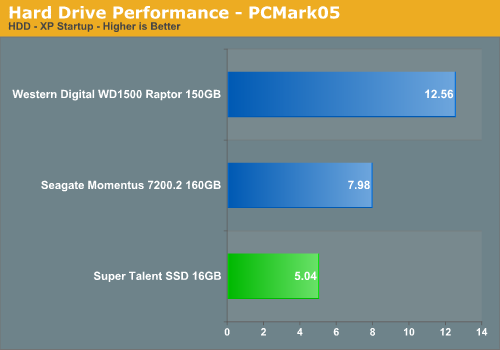
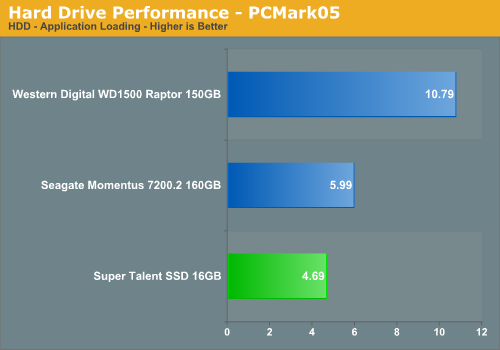
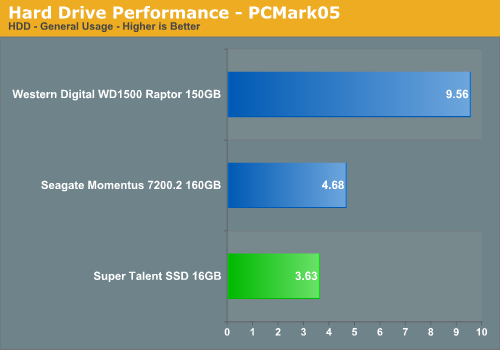
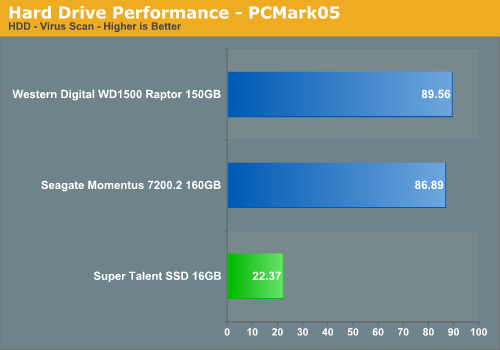
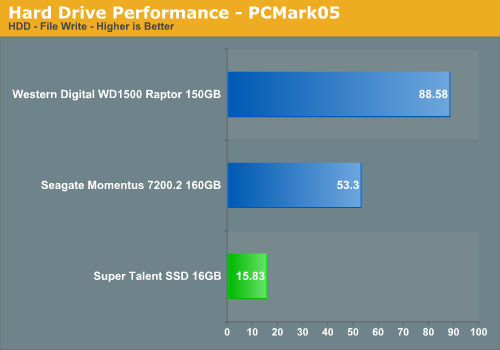
Our PCMark05 results show the Super Talent drive performing as expected considering the read and write speeds are limited to an average of 25 MB/sec. Solid State Drives feature extremely low access times that are usually in the <1ms range and with no moving parts the first three PCMark05 test that feature read speeds over write speeds show the drive being competitive to some degree even with the industrial usage design.
We fully expected the File Write tests to show major differences based on the low write speeds of the disk and it does when compared to our other test drives. However, these differences are minor when considering the drive will be used in applications where write speeds are not paramount to the performance of the drive. The results in PCMark05 will be reproducible in our limited test suite.
We are utilizing the HDD test suite within PCMark05 for further comparative hard disk scores as it provides a mixture of actual application results and specific read/write percentages utilized within these programs. It is also a readily available benchmark that others can use for comparative purposes. The program utilizes the RankDisk application within the Intel iPeak SPT suite of tools to record a trace of disk activity during usage of real world applications. These traces are then replayed to generate performance measurements based upon the actual disk operations within each application. The HDD test suite contains 53% read and 47% write operations with each trace section utilizing varied amounts of read or write operations. Additional information about the test suite can be found in PDF format here PCMark05 whitepaper.
The PCMark05 test results are based upon the following trace runs:
Windows XP Startup: This test consists of 90% reading and 10% writes that tracks XP activities at start-up.
Application Loading: This test consists of 83% reading and 17% writes that tracks the opening and closing of the following programs.
- Microsoft Word
- Adobe Acrobat Reader
- Windows Media Player
- 3Dmark 2001SE
- Leadtek WinFast DVD
- Mozilla Internet Browser
- Opening a Microsoft Word document, performing grammar check, saving and closing
- Compression and decompression using WinZip
- Encrypting and decrypting a file using PowerCrypt
- Scanning files for viruses using F-Secure Antivirus
- Playing an MP3 file with Winamp
- Playing a WAV file with Winamp
- Playing a DivX video using the DivX codec and Windows Media Player
- Playing a WMV video file using Windows Media Player
- Viewing pictures using Windows Picture Viewer
- Browsing the Internet using Microsoft Internet Explorer
- Loading, playing and exiting a game with Tom Clancy's Ghost Recon
File Write: This test consists of 100% write activities by writing 680MB of files onto the hard disk.






Our PCMark05 results show the Super Talent drive performing as expected considering the read and write speeds are limited to an average of 25 MB/sec. Solid State Drives feature extremely low access times that are usually in the <1ms range and with no moving parts the first three PCMark05 test that feature read speeds over write speeds show the drive being competitive to some degree even with the industrial usage design.
We fully expected the File Write tests to show major differences based on the low write speeds of the disk and it does when compared to our other test drives. However, these differences are minor when considering the drive will be used in applications where write speeds are not paramount to the performance of the drive. The results in PCMark05 will be reproducible in our limited test suite.










44 Comments
View All Comments
JarredWalton - Monday, May 7, 2007 - link
The 100,000 writes is per sector (or whatever the flash block sizes are) of the drive, so even if you're generating thousands of writes per day if the writes are all going to different blocks it becomes much less of an issue. That's what the "proprietary wear leveling algorithms along with built in EDD/EDC functions to ensure excellent data integrity over the course of the drive's lifespan" are supposed to address.Unless you are intentionally rewriting a single location repeatedly, I don't doubt that the drives can last 10 years. Considering I have a lot of normal hard drives fail within five years, that's not too bad. Besides, with the rate of progress it's likely that in the future SSDs will get replaced every couple of years just like today's HDDs.
PandaBear - Thursday, May 10, 2007 - link
With wear leveling, it doesn't matter where you write, it is internally mapped to different physical location each time, so it is 100k write per sector x # of sectors = total # of write you can get out of the entire drive.In this case, a bigger drive buy you more than just space, it buys you extra blocks/sectors that it can cycle through and reduce the wear on every single drives.
Reflex - Monday, May 7, 2007 - link
[quote]That's what the "proprietary wear leveling algorithms along with built in EDD/EDC functions to ensure excellent data integrity over the course of the drive's lifespan" are supposed to address.[/quote]Just to address this specifically, there is no such thing as a 'standard wear leveling algorithm', every flash producer has thier own method of wear leveling, so by default they are all proprietary. I am relatively certain that this company has not come up with something so revolutionary that it would essentially change the entire market as you seem to be implying, if they have I am pretty certain these flash chips would be the industry standard by now. Furthermore, were it any more advanced than the competition, it would not be advertised with a 100k write limitation when the industry standard is 250k writes.
Reflex - Monday, May 7, 2007 - link
I am very aware of how it works. However write operations can happen across several sectors. Once again, consider the market these are intended for. You will NOT get ten years out of one on a typical workstation, it simply will not happen. You will get at least a decade out of one as part of a cash register, assembly line robot, or other industrial/embedded purpose, which is what their statement is all about.You are likely to get one to two years out of one of these, tops. Furthermore, when it fails it will be sudden, and you will not be able to recover your data through conventional means.
I highly suggest you test this before you reccomend your readers to use these things as a main drive. I have tested it extensively myself as part of my job. My email is in my profile if you feel the urge to contact me about this.